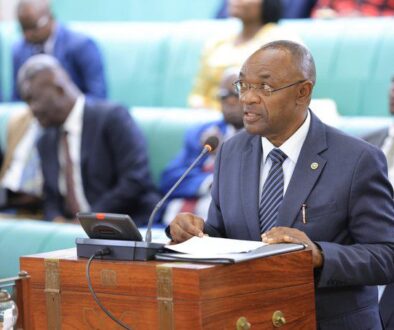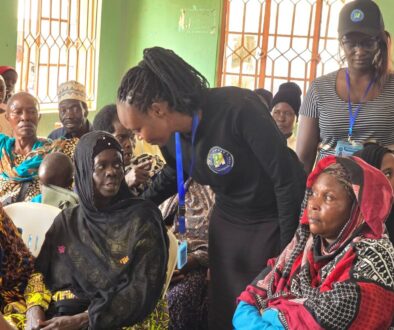Museveni 2024 Priority Plan
Text content

President Yoweri Museveni has underlined priorities for the country and Ugandans in the New Year 2024.
Below is the revised version of his New Year message.
Fellow Ugandans,
I congratulate you for finishing the year 2023 and I wish you a happy 2024.
On this occasion, I want to emphasize four points.
Point number one, is the issue of wealth creation in homes. We have repeatedly told you that there are four sectors of wealth and jobs creation. These are: commercial agriculture with ekibaro (cura, aimar, otita). This ekibaro requirement, forces us to distinguish between intensive agriculture (okukolera awafunda – working using small acreage) and extensive agriculture (using medium size or large-scale pieces of land).
In the former, I have advised you eversince 1995, to only go for high value activities from which you can get good money even if you do them on a small scale. Here, we identified for you, seven activities (enterprises).
These are: coffee; fruits, especially mangoes, oranges, pineapples, apples and grapes; zero- grazing dairy farming; fish-farming; poultry for eggs; piggery; and homestead food crops – cassava, bananas, etc.
People who have listened to this message, are doing well. I have told you of Mr. Nyakana of Rwengaaju, near Fort Portal. I used to tell you of Mrs. Kizza of Masaka. Recently, our son, the Hon. Byamukama of Kakumiro, has set up a very good demonstration personal farm, from which he makes a profit of Shs.55million per month (profits and not gross earnings).
This is Shs.660million per year. He is selling 302 trays of eggs per day in addition to milk, bananas, etc. This is just on 4 acres. There are very many coffee farmers in Masaka, Bundibugyo and other areas, who have listened to our advice.
The cattle corridor has become prosperous by the mere fact of change in enterprise selection from beef to dairy, some elements of under-utilization of the land that still persist, notwithstanding. I will meet the dairy farmers of Kiruhuura and Kazo Districts on the 2nd of January, 2024, to discuss that under-utilisation, among others issues.
You cannot have intensive agriculture, without extensive agriculture for a lucky country like Uganda which is capable of both. In order to support the dairy, the fish-farming, the piggery, the poultry enterprises, you need animal feeds. Where do the animal feeds come from? They come from maize. Who should produce maize and other additives like soya beans, etc.? It should not be
the small -holders of 4 acres or less.
Why? It is because the earnings per acre are small. One acre of maize in a year, will give you Shs.4million (2planting seasons). If you have got only 3 acres or one acre for commercial agriculture, how will that money get you out of poverty? Remember the Shs.4million includes costs; it is gross income, not profits.
However, for somebody with 100 acres, he will earn 400million and for somebody with 1,000 acres, he will earn Shs.4bn. Therefore, low value crops like maize, like cotton, like sugar cane, etc., will earn alot of money if they are grown on a large
scale. Moreover, the intensive agriculture cannot be profitable without the large-scale (extensive) agriculture. Maama Janet and Myself, get good money from the Ankole long horn cattle at Kisozi because we rear them on a large scale. We would not make good money if we were rearing them in one acre, which would mean 12 cows with zero grazing.
With beef, you sell 20% of the herd in a year. In this case, it would be two cows. How can you get out of poverty with this type of money?
Therefore, please Ugandans with agricultural land, this is the way to go. These policies have already caused alot of changes in our economy.
Coffee production now stands at 9million bags from 2 million bags in 1986. Milk production is now 5.2 billion litres from 2m litres in 1986. The cattle are now 16 million compared to 3 million in 1986. Tea production is now 60million kgs compared to 3 million kgs in 1986. I can go on and on. This expansion is by those families that listened to our message. What will happen if all the families with land for agriculture, listen to our message?
The other sectors of wealth and jobs creation, are industry, services and ICT. Industry has two parts: factories and artisanship. We now have 8,617 factories in Uganda, employing 829,668 people. Factories are flooding in. The only slowing factor has been the corruption of some parasites that have been asking for bribes to give the entrepreneurs land or licences. Otherwise, the potential is huge.
Additionally, we need to harmonize with our people working in the factories. Sometimes, they are impatient for good
salaries from the employers. We agree that our factory and other workers should get good salaries if the employers are getting good profits. Profits, are influenced by the costs of production. How much does electricity cost? How about water, etc.? The Government is working on this issue of lowering costs to make Uganda’s products competitive in the domestic and export markets. These are the costs of electricity, water, transport, the cost of money borrowed from banks, etc.
As we lower these costs to the rational and realistic levels, we will be able to correctly deal with the issue of the salaries of workers. Otherwise, we are pushing for all round industrialization, using our raw-materials from agriculture; forestry; fisheries; minerals; etc. The NRM plan has always been to shift people from agriculture to industry and services. Those sectors’ absorption capacity, is much bigger than agriculture. Too many people in agriculture, is part of the under-development. A tractor can plough 1,200acres in a season. The 40 million acres of Uganda that are arable, therefore, need 30,000 tractors and their drivers.
Even when you include other activities such as harvesting, you will find that the present huge number of people in agriculture, are redundant; therefore, they are part of disguised unemployment.
In the coming year, we shall continue our efforts in rationalizing the economy and society of Uganda. With regard to the artisans, I have set up 18 skilling hubs in the whole country. These skilling hubs, deal with carpentry, metal work, shoe making, motor mechanics, etc. I have directed the State House Comptroller (SHC), to expand the spectrum of the skills to include textile technology, ceramics, ICT, etc. This is in addition to the technical colleges in the country.
On the side of the capital after getting the skills, there is the Emyooga money. We are also ready for any other ideas as to how we can empower the skilled youth after their training.
The third sector is Services, which means transport, hotels, tourism, professional services (lawyers, doctors, engineers, preachers,
musicians, etc.). This is a fast-growing sector and it is now employing 4.14 million people. We are working on disciplining some aspects of this sector, including assisting, for instance, the musicians to record their songs and also protecting their innovation by Copyright Law.
Otherwise, with the peace, this sector has been thriving.
The ICT sector is a new sector, but many of the ICT graduates are being absorbed into this sector. It is now employing 2.3 million people (both direct and indirect jobs). It will, however, grow more when our people implement BPO (Business Process Outsourcing) – which means that you, for instance, set up book-keeping operations in Kampala, but you provide those services to companies in the USA or Canada and send the work over our Internet and you are paid here. In India, this sector is employing 10million people and earning US$ 51bn. You know how our Bazukulu speak those foreign languages very well. All the above, deal with the issue of homestead incomes and jobs.
The second point is corruption. Those who have allowed themselves to soil their contribution, have only themselves to blame. As I said, recently, the corrupt are the minority and it is those who have access to power and public money and they use that access to be corrupt at the expense of the majority who are the victims. It is, however, easy to trace these parasites and smoke them out. Keep tuned on this channel.
The third point is regional integration. Why regional integration? It is because we need it for prosperity through the wider market it provides for our goods and services. About a year ago, I had to kill the unholy idea of banning Tanzanian rice. Why ban Tanzanian rice? It was because it was cheaper than the Ugandan rice produced by swamp destroyers. The proposal was that I commit three mistakes or even sins. Sin number one, punish Ugandan rice consumers (I am not one of them), by forcing them to buy the expensive rice by Uganda’s inefficient producers and therefore, empty their pockets.
Secondly, kill or disrupt the Tanzanian efficient rice producers instead of helping them to grow. Thirdly, provoke Tanzania to ban our products going into the Tanzanian market and, therefore, propel the suicidal practice of protectionism that has crippled many regions in the World. The NRM will not be part of those blind policies. Some of the Ugandan business people cite the non-tariff barriers practiced by other countries. In the early years of our Government, Mzee Moi, at one time, closed the border, but I rejected the arguments for retaliation.
Today, Uganda’s exports to Kenya are either equal to our imports from there or, sometimes, they are higher. Rationality cannot be ignored indefinitely. We shall continue discussing with our EAC Partners and, I am sure, we shall end up with a real common market, free of non-tariff barriers because those barriers hurt the wanainchi of all our countries.
The fourth and final point is, again, the terrorists from Congo. We are continuing to destroy those people in Congo, using, mainly, air-attacks, because they are faster and can reach everywhere. In desperation, the terrorists have been trying to send squads into Uganda to kill unarmed civilians and plant bombs. They are able to do this because the border is u unclosable – it is long and has many crossing points, many of them in the bush. Besides, we do not want to close the border, because we shall disrupt the lives of the brother peoples of Congo and Uganda.
Apart from destroying the source by attacking those criminals in Congo, therefore, the other correct answer is thorough intelligence and internal mobilization. The group of Njovu – Kamusu of 10 that entered from Congo some few months ago, has now
remained with 3 people, if not two. Njovu was captured, Kamusu was killed two days ago and the others were killed in the different engagements. They are now sending bombers to kill our Bazukulu that have taken up umalaya because they live in ghettos where, sometimes, there are no cameras. Therefore, all our Bazukulu, be alert. Let everybody show you his electronic identity card issued by NIRA. Do not accept those printed at Nkrumah Road.
Bazukulu, anybody approaching you and wanting you to keep his bag or package, insist that he opens it. If you see anything suspicious, such as a mobile telephone in the middle of the package, call the Police. All hotel and lodge owners to insist on seeing electronic identity cards of everybody and record them. We are hitting them so hard. They will soon run out of people to send for bombing. In the meantime, vigilance.


